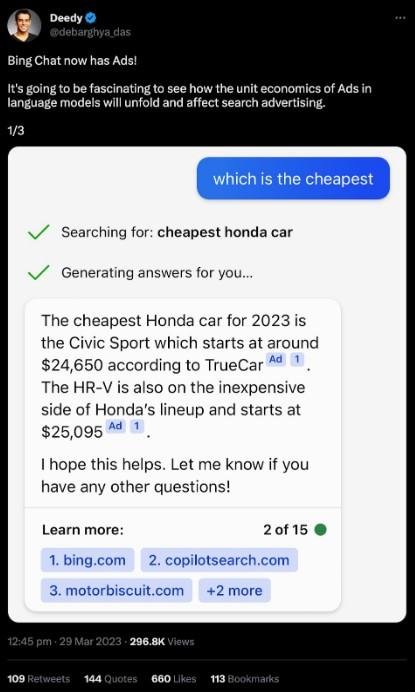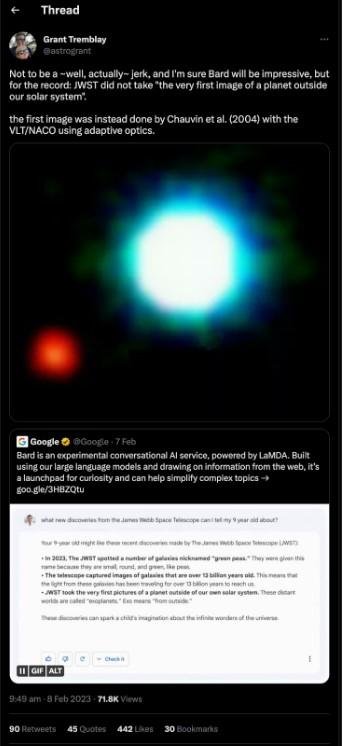
AI & Search: What does the future look like?
share on
Conversational AI tools are advancing exponentially and fast becoming the hottest topic in technology. With recent revolutionary advancement, it has become understandably overwhelming for marketers to keep up. For those focused on the impact to search marketing (organic and paid), the changes happening could signal a new era.
The evolutionary leap of GPT-3 (and now GPT-4) by OpenAI set the stage for what is rapidly becoming an AI “battle” of sorts, with Microsoft, who are integrating ChatGPT tech into Bing, and Google, with its conversational AI tool named “Bard” entering open beta, and the recent launch of it’s new conversational search engine interface.
All tools, whilst still being experimental demonstrations of the power of the technology, have already proven that exponential change is on the horizon when it comes to how users will search online, now and in the future.
Online search is set to be the battleground, and AI platforms could challenge the dominance of Google and the balance of the over $100 billion search marketing industry. Reports had even surfaced that Samsung is already planning to remove Google as the default search engine on its devices, which prompted Alphabet shares to immediately drop as much as 4%.
Don't miss: Google's Bard for dummies: What is this new AI software that could challenge ChatGPT?
What changes are incoming? And how can marketers prepare for the future?
The future of search is being described as “conversational search”. Essentially this would allow users to submit queries, through voice as well as text, and receive answers in the form of a conversation. Keyword search has been the method used for many years, where users enter short phrases or important keywords only, whereas a conversational search system takes complex grammatical sentences and can use context from previous interactions to provide more useful and comprehensive results.
Google was already sprinting to develop “Magi”, a project name for an all new search engine that would offer users a far more personalised experience than the company’s current service. The announcement of generative AI powered search engine features integrated into Google Search at Google I/O event recently shows that the search giant is already making significant progress, and quickly.
Conversational search is in high demand by users - it's fast, convenient, and tailored to their specific needs. People don't need to worry about keywords or sifting through thousands of results – they can just ask a question and get an answer.
The future of search advertising in this new landscape is a little different to what we currently see today. Normally, when you perform a search on Google or Bing, you see sponsored ads appear at the top of most results pages that are targeted by the search terms that have been entered. With conversational search, this becomes different - search ads will be potentially targeting keywords in the questions asked, coupled with previous conversation topics, and user's interests and history.
Ads are linked naturally in output text and become a part of the conversation taking place. Users have already seen Bing testing this in their current interactions with Bing chat AI, and Google already doing so in their early US only preview of the new Google search experience.

Google’s new search offering is already following along similar lines, and one would assume they will continue to integrate conversational advertising to the entire experience, as their search ads business remains under threat. The quick counter-launch of Bard was met with some controversy as the tool was outputting factually incorrect information in an early demo, a clear example of how the speed of AI tech needs to be met with vast amounts of training, verification and QA.
I also imagine that the new updates to Google Search will also be scrutinised heavily, and require a good measure of exploration from testers and general users to seek out inaccuracies.

I'd highly recommend registering for the Bing Chat, Bard, and Google Search Labs (Google Search is US only testing at the moment) experimental demos to test out typical prompts and questions you would ask a search engine, and to extend those prompts into conversations. By doing so, you will be getting a glimpse into what will be standard online search very soon - no sifting through results, just conversational answers in easily digestible responses.
How can brands and advertisers (search marketers) react to these changes?
Understandably, there is much concern from the world of search marketing that AI is here to take our jobs. As it currently stands, automation and machine learning have been a large part of search marketing and SEO indexing for some time. The current iterations of both OpenAI’s ChatGPT and Google’s Bard have vastly improved AI’s capabilities, but we are still some way from them being able to run our campaigns.
In the here and now, there is much we can do at the intersection of currently available AI technology and human driven search campaigns. For example, the tools are extremely effective at developing keyword lists based on ideas or topics presented, as well as variations of ad copy for paid search campaigns.
Both Bard and ChatGPT (and soon Google Search) can also create content articles to support organic search based around particular topics with word limits in mind. With content pages for example, a prompt such as “Write me an article about the trends in digital marketing, in 500 words” would instantly produce content that could potentially be the starting point for a marketer to begin a content writing project, rather than the second or third draft. Since they are based on large language models (LLMs), they are also prone to reproduce any biases or errors that they have ingested. These are also known as “hallucinations”, answers that appear as output that seem plausible, but are factually incorrect. I would caution to always refine and revise any output from AI tools, and be extremely careful with the responses that are produced.
It’s also worth asking the Bard and ChatGPT tools to recommend sources or sites that can aid in further content research, as well as serve to verify the accuracy of AI output results.
Agencies are already leveraging the power of generative AI to supercharge workflows and make life easier for their teams. Workflows that had previously taken hours of research or input, now take minutes to complete. This leaves more time for developing strategy and planning, and higher client satisfaction overall.
How you and your teams should prepare for the new future
There is a lot that brands and marketers can do to prepare for the radical changes coming soon to the search landscape.
Here is where search marketers should get started:
- Define your AI use policy from both a legal and user perspective, and create standard operating procedures for the use of AI tools. For example, Media.Monks has created an internal “AI Dos & Don'ts” process guide, as well as internal best practices for AI use and provisioning.
- Create clear internal processes and helpful workflows for where AI is safe and best to use, such as structuring questions for key processes (E.g. example prompts to create ad copy, keyword lists, content, or even perhaps code snippets).
- Clearly define company internal and confidential information that is not to be shared with AI tools. Prompts entered into these tools will be saved and stored on external servers to your business.
- Ensure that users of AI tools are verifying output supplied by those tools, and that it is fit for sharing or client work.
- Be transparent with clients and stakeholders about the use of AI.
In summary, a lot is going to change.
This is just the beginning of what will soon become the norm in how most of us search and interact with the web, and potentially all of our devices. Whilst Google and Microsoft rapidly upgrade their capabilities with new AI models and modes of interaction, marketers can be prepared for the changes by testing and working with these AI tools, to harness them for productivity and campaign creation.
Both Google’s Bard and ChatGPT are in experimental open beta right now so the opportunity to test them and be acquainted with the future of conversational search is painless. For search marketers in particular, it is now more important than ever.
The article was written by Dexter Laffrey, head of search APAC, Media.Monks.
Related articles:
GPT-4 for dummies: 101 on the even more powerful version of ChatGPT
Will ChatGPT replace search engines as we know them right now?
Snapple fun facts to now be written by AI, uses ChatGPT for press release
share on
Free newsletter
Get the daily lowdown on Asia's top marketing stories.
We break down the big and messy topics of the day so you're updated on the most important developments in Asia's marketing development – for free.
subscribe now open in new window
